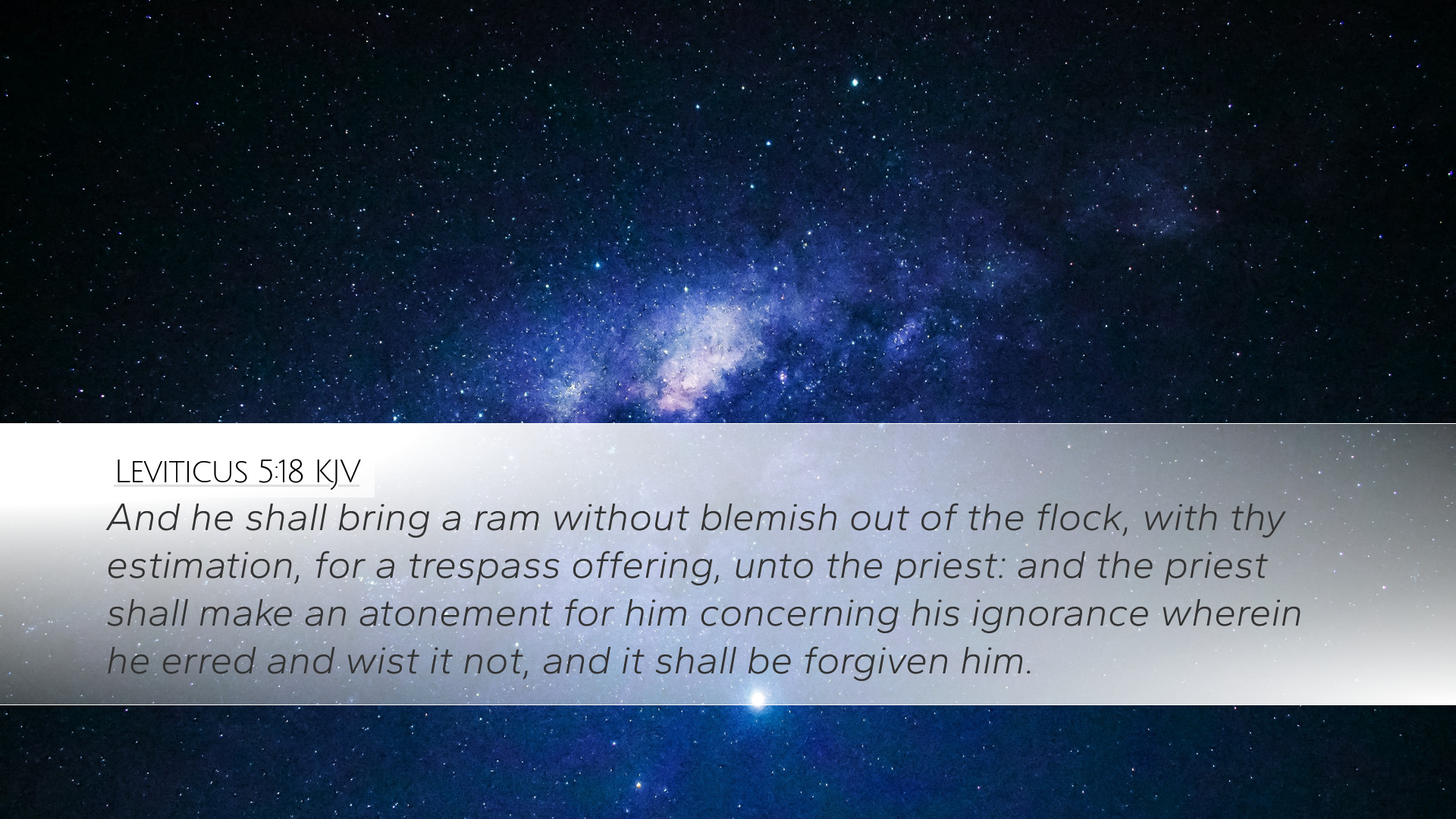Commentary on Leviticus 5:18
Verse Reference: Leviticus 5:18
Text: "And he shall bring a ram without blemish out of the flock, with thy estimation, for a trespass offering, unto the priest: and the priest shall make an atonement for him concerning his ignorance wherein he erred and wist it not, and it shall be forgiven him."
Context Overview
The Book of Leviticus contains the Mosaic laws regulating the worship of God and the conduct of the people toward Him. Central to these laws are the principles of holiness and atonement. Leviticus 5 deals specifically with trespass offerings and the means through which Israelite worshippers could atone for unintentional sins. This is the context in which Leviticus 5:18 is situated.
Understanding the Offering
Nature of the Offering: The offering required is a ram without blemish, symbolizing the necessity for purity in offerings presented to God. Matthew Henry notes that the "ram, as a male, implies strength and value," pointing to Christ, the ultimate sacrifice.
Importance of the Priest: The role of the priest is vital in atonement. As Albert Barnes explains, the priest serves as an intermediary who ensures that the appropriate sacrifices are made according to God's law. The priest’s acceptance of the offering on behalf of the worshiper signifies that proper procedure has been followed.
The Concept of Ignorance in Sins
Unintentional Sin: The verse emphasizes sins committed in ignorance. Adam Clarke reflects on this, stating that many actions may be sinful without the person being aware of it. Ignorance does not absolve the individual from accountability but allows a pathway for atonement.
This also speaks to God's justice and mercy; while He holds individuals accountable, He also provides a means for atonement, acknowledging the complexity of human nature and the circumstances surrounding one’s actions.
Significance of the Ram
Symbolism: The ram, particularly noted for its absence of blemish, serves as a representation of Christ, who is referred to as the Lamb of God in the New Testament. Just as the ram is chosen for its perfection, Christ was sinless and thus able to bear the sins of others (1 Peter 1:19).
Additionally, the requirement of a ram points to the costliness of sin, underlying the seriousness with which God views even unintentional transgressions. As Matthew Henry states, “God does not accept our offers to Him unless they pass through the hand of the priest.”
Theological Implications
Requirement of Atonement: The need for atonement in the case of unintentional sin underscores the idea that all sin, no matter how accidental, violates God's holiness and disrupts the relationship between the sinner and God. The requirement for a sacrifice teaches about the weight of sin.
God’s Forgiveness: The provision for forgiveness found in this verse highlights God’s grace. His willingness to forgive unintentional sins encourages believers to approach Him with humility and sincerity, knowing that through faith and obedience to His commandments, they can receive mercy.
Practical Application for Believers
Self-Examination: Leviticus 5:18 encourages believers to engage in self-examination, acknowledging the areas where they may unknowingly fall short. Awareness of such sins should drive one to deeper study of the Scriptures and prayer.
Confession and Repentance: The prescribed act of bringing a ram for atonement calls Christians to a posture of repentance. Practitioners of faith are encouraged to confess their unknown sins, affirming a desire to maintain a healthy relationship with God.
Community Aspect: This verse can also serve as a reminder for community accountability, where fellow believers help one another in seeking more profound faithfulness and understanding of God’s laws, much like priests guided the people of Israel.
Conclusion
In conclusion, Leviticus 5:18 encapsulates critical theological principles of atonement, grace, and the unintentional nature of human sinfulness. It offers rich material for study and application, resonating deeply with core Christian beliefs regarding sin, sacrifice, and redemption.
For pastors, students, theologians, and Bible scholars, this verse serves as a springboard into profound discussions about the nature of God’s requirements, the seriousness of sin, and the ultimate hope found in Christ as our perfect sacrifice.


